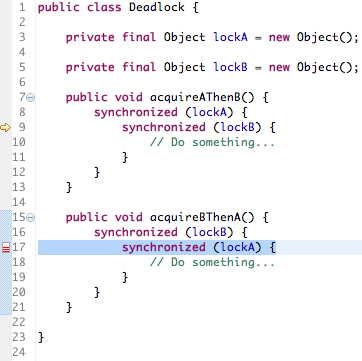

Database deadlock exception code#
Double check your code and ensure that there are no competing transactions that may cause this. I do not think anything in TIBCO will prevent this from happening since this is a database issue.

So the two transactions end up waiting for each other (deadlock) until detected by the SQL Server engine who simply chooses a victim transaction to stop (yours in this case).

TransA then tries to lock resourceB (while keeping the lock on resourceA), and transB tries to lock resourceA (while maintaining its lock on resourceB). TransA locks resourceA to perform changes, and transB locks resourceB.
Database deadlock exception update#
Concurrently transB tries to update resourceB and then resourceA (note the reverse order). A deadlock condition results typically from two competing transactions: let's say transA must update resourceA and then resourceB. And it keeps those locks up to the end of the transaction. The database must acquire a lock on the resource that must be modified. I am not quite sure what your JDBC Update activity is trying to do, but there seems to be something else in the database that, in conjunction to your activity, wants to make some changes to the same tables.ĭeadlocks come from two processes (transactions) that update the same resources (tables, rows etc). How we can set the property's value? or is there the other idea?įrom the error message, the deadlock is coming from your SQL Server database. Rerun the transaction.Īt .SQLServerPreparedStatement.executeBatch(Unknown Source)Īt .JDBCUpdateActivity.executePreparedStatement(JDBCUpdateActivity.java:392)Īt .JDBCStatementActivity.evalPreparedStatement(JDBCStatementActivity.java:486)Īt .JDBCStatementActivity.performDatabaseOperation(JDBCStatementActivity.java:95)Īt .JDBCActivity.eval(JDBCActivity.java:1099)īut I found that a blog on the Internet said that there is a property named sendStringParametersAsUnicode ,whose value is True by default in the sqlserver jdbc driver, so it can result in an implicit conversion to string which result non-compatibleĭata type to the DBURL, when it is processed in the database. Rerun the transaction."Īt .JDBCActivity.eval(JDBCActivity.java:1221)Īt .(Activity.java:240)Īt .(TaskImpl.java:775)Īt .(Job.java:729)Īt .(Job.java:518)Īt .core.JobDispatcher$nx(JobDispatcher.java:249)Īt .core.JobDispatcher$n(JobDispatcher.java:200)Ĭaused by: : .SQLServerException: Transaction (Process ID 109) was deadlocked on lock resources with another process and has been chosen as the deadlock victim. Please let me know when you need more info or explanation.When I run a project in the admin env, a deadlock error always occurred as below:ĭownloader BW-JDBC-100014 Job-8 Error in "JDBC error reported: (SQLState = 40001) - : .SQLServerException: Transaction (Process ID 109) was deadlocked on lock resources with another process and has been chosen as the deadlock victim. Please note that this is just a tip of the iceberg and find out more about locking, lock promotion, database transaction scope, and locking types (optimistic, causious, paranoid).Įspecially with timers in a multi-tenancy situation this problem will occur sooner or later. The only way to prevent this is to do proper analysis of the access paths to the data by the concurring processes and take charge of the sequence in which database records are being locked. Problem will grow bigger when other processes join the embrase and the problem is to become worse, That will never happen and thus the DBMS decides to kill one the two processes to prevent that this Process B holds a lock on record Y and wants to lock record ZĪs you can see the processes are waiting on each other to release the lock on the records they need. Process A locks record Z and wants to lock record Y What you don't see is that records in the tables (and indexes) are (implicitly and sometimes explicitly (GetForUpdate)) being locked during the processing of your SELECT, UPDATE and DELETE statements. Two processes work with the exact same data.

When the database management system (DBMS, SQL Server in your case, Oracle in my environment) detects a deadlock this is what happens: A deadlock is also called 'a deadly embrase'.


 0 kommentar(er)
0 kommentar(er)
